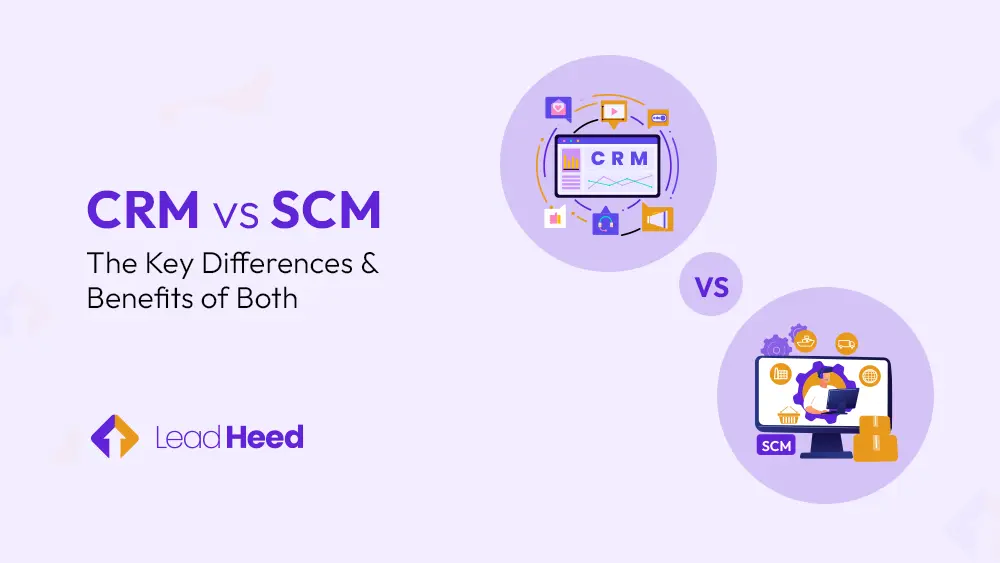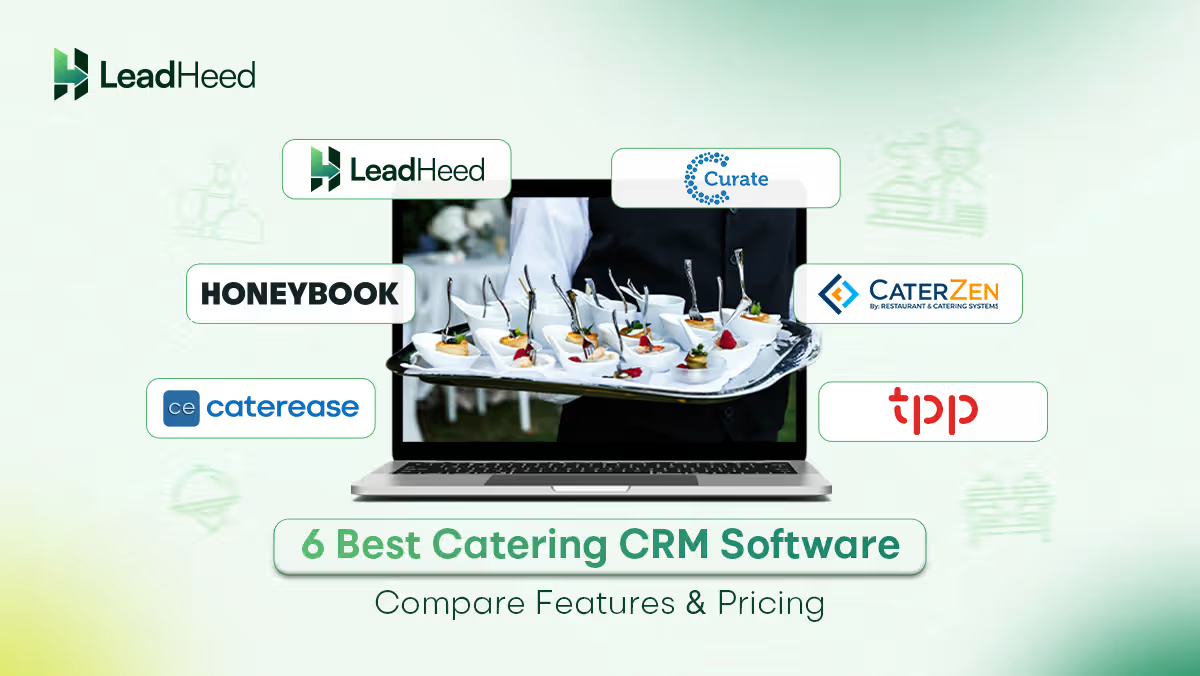When your sales team is closing deals but orders aren’t delivered on time—or when operations run smoothly but customer loyalty lags—it’s time to reconsider your systems.
This is where understanding CRM vs SCM becomes essential. CRM (Customer Relationship Management) focuses on nurturing relationships, while SCM (Supply Chain Management) ensures timely and efficient delivery. Knowing how each system works and how they can work together helps you streamline business operations and boost customer satisfaction.
In this blog, we will identify and outline the differences between the two and show how aligning the two can help drive true growth in a business.
What is CRM?
A CRM (Customer Relationship Management) system helps companies build better relationships with their customers. It keeps all customer information, like names, purchases, and past conversations, in one organized place.
This information lets teams send personalized messages, track sales possibilities, and respond to customer needs quickly. Marketing teams can see how well their ads work, sales teams can connect with customers using valuable insights, and support teams can fix problems faster.
Everyone uses the same customer data, so teams stay on the same page. This makes customers happier, improves teamwork, and helps the business grow.
What is SCM (Supply Chain Management)?
An SCM system helps companies manage how products are made and delivered, from raw materials to the final customer. It connects important tasks like tracking inventory, orders, deliveries, and predicting supply and demand.
This software links different business teams, making production and delivery smoother. For example, customer service can track shipments, manufacturing can check stock levels, and accounting can use real-time data for budgeting.
By keeping all supply chain information in one place, SCM systems reduce delays, save money, and boost efficiency. They also help manage suppliers, control inventory, and keep everything running smoothly.
What Are The Key Differences between CRM and SCM?
A CRM helps you manage customers and keep them happy. SCM helps you manage products and make sure they get delivered on time. CRM focuses on people, whereas SCM focuses on operations. Understanding these differences helps your business run smoothly.
|
Customer Relationship Management (CRM) |
Supply Chain Management (SCM) |
| 1. CRM is customer-centered. | 1. SCM is operation-centered. |
| 2. Manages relationships, communication, and sales to improve customer satisfaction. | 2. Manages the supply chain process to make production and delivery efficient. |
| 3. Mainly used by sales, marketing, and support teams. | 3. Mainly used by operations, procurement, and logistics teams. |
| 4. Focuses on building and managing customer relationships. | 4. Focuses on managing the flow of goods, services, and resources. |
| 5. The main goal is to boost customer satisfaction and retention. | 5. The main goal is to reduce costs and increase efficiency. |
| 6. Stores contact info, purchase history, preferences, and communication logs. | 6. Tracks inventory levels, supplier information, production schedules, and shipment details. |
How SCM and CRM Work Together?
CRM and SCM work better when they’re connected. CRM collects customer info like orders and feedback, while SCM handles stock and delivery. When they share data, it’s easier to meet customer needs, avoid delays, and keep everyone on the same page. This integration helps businesses match customer demand with supply in real time, ensuring operational efficiency.
Here’s how they work together:
1. Data Moves from Customer to Operations
CRM stores customer preferences, order patterns, and feedback. SCM uses this data to plan purchasing, production, and delivery. For example, if customers often reorder the same product in the same period, SCM can prepare stock in advance to avoid shortages.
2. Real-time Inventory Visibility for sales and support
When you integrate your CRM with SCM, the CRM can access inventory information from the SCM platform. This allows sales and customer service staff to provide clients with accurate information on stock status, order delivery times, and product availability.
3. Order Tracking and Fulfillment Updates
When a customer places an order, the order information is sent from the CRM to the SCM. The SCM system is responsible for the picking, packing, shipping, and delivery of the order. The status of the order is updated in real-time in the CRM, allowing sales and support teams to keep customers informed during every stage of the fulfillment process.
Both the CRM and SCM act as shared communication channels. If a delivery is delayed and the SCM system logs the update, the CRM notifies the customer service rep to follow up. This is particularly important for making sure misinformation does not spread, as every department has access to the same information.
5. Forecasting and planning coordination
Because CRM systems provide insights into consumer behaviors and trends, those insights are sent to the SCM platform. The SCM uses the data to improve forecasting models of consumption. This means production switching and inventory planning can be coordinated with actual customer behavior, thereby minimizing overproduced items and missed sales.
How does CRM benefit Supply Chain Management?
A CRM benefits the supply chain by helping businesses better understand customer needs, improve communication across departments, and forecast demand more accurately. This leads to faster delivery, happier customers, smarter inventory decisions, and smoother business operations.
Explore this section to see exactly how CRM can improve every step of your supply chain.
1. Improve Customer Satisfaction
When the supply chain teams leverage CRM data to understand customer buying patterns and customer expectations, they can meet customer needs much faster. Whether it’s delivery speed, shipping methods, or product availability. This leads to stronger loyalty and a better overall experience.
2. Enhances Communication
A CRM holds relevant and accurate data about customer interactions across all departments (sales, customer services, logistics, suppliers) in a centralized location. This acts as a single source of truth around the customer.
This frees up teams to work collaboratively and improve functions. Everyone has access to the same information, reducing delays, miscommunication, and order errors.
3. Supports Accurate Forecasting
CRM systems can provide insight into seasonal trends and purchasing habits. When demand planning and supply chain teams use these models, they enhance demand forecasting and minimize overstock or understock issues. This ensures production aligns closely with actual market demand.
4. Enables Personalized Supply Chain Services
With customer insights from CRM, companies can vary some components of the supply chain. For example, offering preferred delivery options, rewarding repeat buyers with faster shipping, or customizing products for their loyal customers. All these actions add up and improve customer retention.
5. Provides Better Inventory Monitoring
Real-time demand tracking guides inventory management. CRM tools show which products sell fast or stay unsold. This helps supply chain managers stock smarter, cut waste, and meet customer needs.
6. Improves Supplier Relationships
A CRM is useful for more than managing customer data; it also tracks supplier management, including delivery timelines, product quality, and communication history. By keeping everything documented and orderly, companies will strengthen their partnerships, negotiate for improved terms, and serve as a reliable partner for their overall suppliers.
Comparing CRM And SCM With ERP
While CRM helps you manage customer relationships and SCM ensures your products are delivered efficiently, an ERP system (Enterprise Resource Planning) brings both under one roof.
Instead of using separate platforms for sales, supply chain, accounting, or HR, ERP unifies everything. This allows teams to work from shared data, reduce manual processes, and respond to changes in real time.
You’ll discover how each tool supports your business and when using them together makes the most sense.
- CRM (Customer Relationship Management) helps you manage customer relationships, track sales, and manage service requests. This system is primarily focused on building durable customer relationships and making customers happy.
- SCM (Supply Chain Management), on the other hand, deals with the flow of materials, goods, and services, from the incorporation of the raw supply to the delivery of the final product to the customer. It focuses on the flow of inventory, shipping methods, and materials with suppliers, to ensure everything runs smoothly and on time.
- ERP (Enterprise Resource Planning) is a system that brings everything together in one place. Instead of using separate tools for sales, supply chain, accounting, or HR, ERP lets all departments work on the same system. This means they can share data, avoid delays, and stay updated in real time.
For example, when an order is placed in CRM, the ERP updates inventory, alerts the warehouse, generates the invoice, and tracks delivery—all automatically.
This unified approach minimizes delays, reduces errors, and gives businesses a complete operational view. This comparison of ERP vs CRM vs SCM helps businesses decide whether to use separate systems or a unified platform for better control and visibility.
Conclusion
CRM and SCM are two powerful systems that serve different yet complementary purposes in a business. While CRM focuses on building strong customer relationships, SCM ensures products are delivered efficiently and on time. When combined, they improve communication, reduce delays, and help meet customer needs more effectively. This leads to better service, smarter planning, and stronger business growth.
Ready to elevate your customer relationships? Explore LeadHeed’s CRM – contact for a demo or consultation now!
Frequently Asked Questions (FAQs)
What is the difference between CRM and SCM?
CRM (Customer Relationship Management) focuses on managing customer relationships, sales, and service. SCM (Supply Chain Management) deals with the flow of goods, inventory, and delivery operations. CRM is customer-focused, while SCM is process-focused.
Can my business benefit from integrating CRM and SCM?
Yes, integrating CRM and SCM helps your business match customer demand with supply more effectively. It improves communication between teams, reduces delays, enhances customer satisfaction, and streamlines operations from order to delivery.
What are some common challenges when implementing CRM or integrating it with SCM?
Some challenges include isolated data, system compatibility issues, and lack of team coordination. To avoid these, businesses must ensure clean, shared data, proper system integration, and cross-department collaboration from the start.
Is CRM part of the supply chain?
CRM is not a direct part of the supply chain but supports it by providing valuable customer insights. These insights help the supply chain team plan better, respond to demand faster, and deliver a more personalized customer experience.



